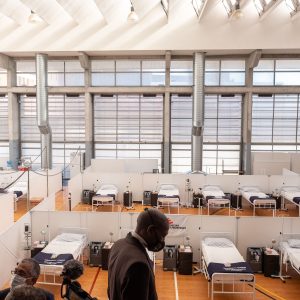Corticosteroids curb Covid-19 mortality rate
South African health professionals are treating hospitalised Covid-19 patients with an anti-inflammatory drug that is helping some stay off ventilators.
Author:
6 August 2020

For the past few months, a group of doctors at Charlotte Maxeke Johannesburg Academic Hospital have been using anti-inflammatory drugs called corticosteroids to treat critically ill Covid-19 patients. Different types of these steroids include hydrocortisone, methylprednisolone, prednisolone and dexamethasone.
This group of drugs has helped decrease mortality rates, says Guy Richards, professor at the critical care unit at the University of the Witwatersrand.
Richards says the steroids are administered when patients are admitted with the viral pneumonia that is caused by the body’s response to Covid-19. “In other words the body mounts an immune response to the virus. That is a major component or cause of the inflammation that occurs in the lungs themselves. … At that point we give the corticosteroid to suppress that immune response which is causing the lung disease that is occurring at that time.”
Richards emphasises that it is crucial to give a low dose of the corticosteroids because a high one makes the patient immunosuppressed, leaving them less able to fight infections. The function of the medication is to provide balance.
In June, a randomised clinical trial conducted by the University of Oxford in England revealed that dexamethasone can reduce death in critically ill Covid-19 patients. The trial looked at a range of different drugs to potentially treat Covid-19.
Related article:
The 2 104 patients who took part in the trial were given 6mg of dexamethasone daily. Their results were compared to 4 321 patients who were not administered the drug. The results showed that a low dose of dexamethasone helps reduce mortality rates in patients on ventilators and those who require oxygen.
The clinical trial shows that for every eight patients on a mechanical ventilator, the medication will save one life, Richards explains. He says dexamethasone is not a cure, but an intervention used to decrease mortality. “[The study says] if you have patients who are not yet on the mechanical ventilator, it significantly decreases the number of people who need to go on mechanical ventilation. In other words, it stops the progression of that inflammatory response.”
Dexamethasone
Dexamethasone has been around for years and is used for asthma, allergies and rheumatoid arthritis, says Neelaveni Padayachee, lecturer in clinical pharmacy at the University of the Witwatersrand.
Padayachee says that as soon as the patient develops severe symptoms with Covid-19, the immune system starts to attack the cells that contain the virus. Dexamethasone helps control this response, which can cause run-away symptoms.
The steroid cannot be taken for longer than 10 days, says Padayachee, because long-term use comes with serious side effects. Patients are given the recommended dose for a short period of time in a controlled hospital environment. The short-term side effects are limited and include weight gain and sleep disturbances. Any risks that emerge will be monitored by health professionals, explains Padayachee.
Related article:
Nsovo Mayimele, a pharmacist, says dexamethasone reduces pressure in cells. “Ventilators are there to assist and do what the body can’t do on its own because of the inflammation. Dexamethasone … reduces [that] inflammation.”
On 19 June 2020, health minister Zweli Mkhize released a statement saying the drug has been used by healthcare professionals for years and would be immediately available to patients. “This is one of the medicines where we do have excellent local capacity. There are three major suppliers of intravenous dexamethasone in the country.”
Improvement in patients
Richards says he has already seen an improvement in a large number of patients on corticosteroids, particularly when it comes to reducing the number of Covid-19 sufferers who need to go on ventilators.
“[For example] at Charlotte Maxeke Hospital, the first 100 patients … we [treated resulted in] a 10% mortality rate. In other words, 10% of people died. Remember that, that is only [for] people being admitted to hospital. So the overall mortality rate of those 100 people was extremely low relative to the overall results that one has been seeing from an international point of view,” he says.
Related article:
Although giving patients the drug helped cut the number needing ventilators, there is still a need for more ward space for the large number of patients arriving, Richards says.
He points out that it is essential for general medical practitioners, as well as the public, to understand that they should not think about using corticosteroids of any kind when they are not critically ill or in hospital for oxygen.



